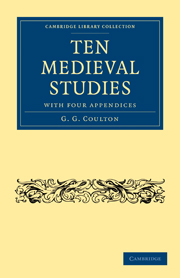Book contents
- Frontmatter
- PREFACE TO FIRST EDITION (1906)
- PREFACE TO SECOND EDITION (1915)
- PREFACE TO THIRD EDITION
- Contents
- I The Monastic Legend
- II A Revivalist of Six Centuries Ago
- III Side-Lights on the Franciscans
- IV The High Ancestry of Puritanism
- V Romanism and Morals
- VI The Truth about the Monasteries
- VII Religious Education before the Reformation
- VIII Priests and People before the Reformation
- IX The Failure of the Friars
- XIII The Plain Man's Religion in the Middle Ages
- Appendices
- Index
VII - Religious Education before the Reformation
Published online by Cambridge University Press: 07 September 2010
- Frontmatter
- PREFACE TO FIRST EDITION (1906)
- PREFACE TO SECOND EDITION (1915)
- PREFACE TO THIRD EDITION
- Contents
- I The Monastic Legend
- II A Revivalist of Six Centuries Ago
- III Side-Lights on the Franciscans
- IV The High Ancestry of Puritanism
- V Romanism and Morals
- VI The Truth about the Monasteries
- VII Religious Education before the Reformation
- VIII Priests and People before the Reformation
- IX The Failure of the Friars
- XIII The Plain Man's Religion in the Middle Ages
- Appendices
- Index
Summary
Both Roman Catholic and High Church papers have lately attempted to contrast the present state of religious education with what they imagine it to have been before the Reformation. There are few more tempting fallacies than that which Sterne has good-humouredly pilloried for all time in his “They order this matter better in France”. Whatever seems amiss in the world in which our lot is cast, we are quick to imagine some golden world in which all was the opposite of this ungrateful present. The fitness of things seems to require it, and we feel that there ought to be—that there must be somewhere—historical evidence for it. It may therefore be worth while, at this particular moment, to confront this fond dream with the real facts, especially since plausible attempts have been made, in the name of serious history, to misrepresent those facts. The editor of the Catholic Times quotes Cardinal Gasquet as establishing the existence of a pre-Reformation England in which education was all that it should have been, and all that it now, alas! is not! One of his correspondents, bolder still, has gathered from the same historian that there was “an age when there would have been no difficulties over an Education Bill, a time when the Church had it all its own way, and yet the Bible was taught … when such immense portions of Scripture were committed to memory, and that by Catholics”. Such grotesque travesties of the actual facts are current not only among those who have most temptation to see one side of the question alone, but even among moderate Anglicans.
- Type
- Chapter
- Information
- Ten Medieval Studieswith Four Appendices, pp. 108 - 122Publisher: Cambridge University PressPrint publication year: 2010First published in: 1930



